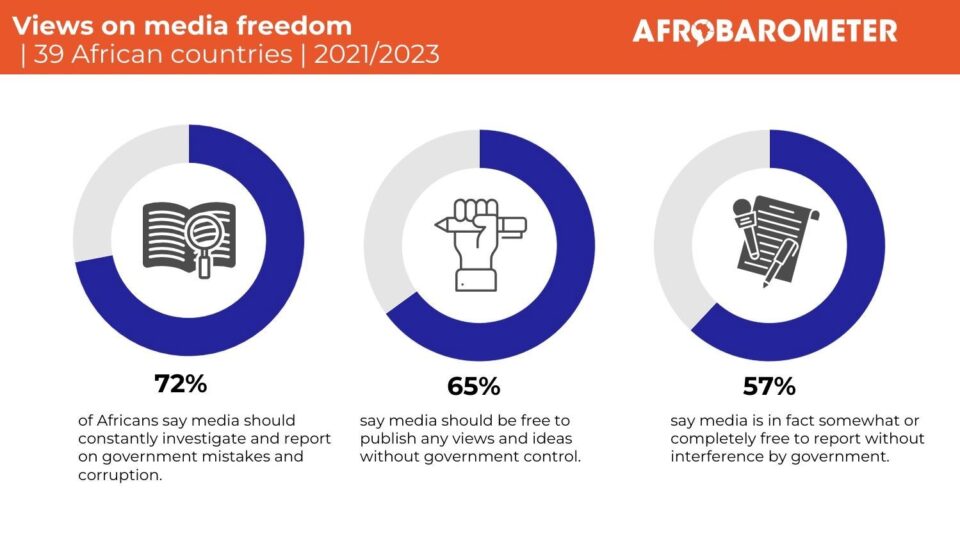Africans overwhelmingly support media playing an important role in holding governments accountable, particularly with regard to the scourge of corruption, the latest Afrobarometer Pan–Africa Profile shows.
Strong majorities support the media’s right to report as they see fit, free of government interference. And a solid majority see their media as largely free, although assessments vary widely by country.
The findings also show important changes in how Africans use media to access news and information. Radio remains the most-accessed medium, although digital use continues to grow. However, despite significant gains in Internet and social media access in recent years, inequities in access across gender, education, age, urban/rural, and income lines persist, and on some dimensions have actually grown larger than when overall access rates were much lower. Radio, on the other hand, continues to be more evenly accessible across demographic groups.
Key findings
- On average, 72% of Africans “agree” or “strongly agree” that the media “should constantly investigate and report on government mistakes and corruption” (Figure 1).
- Only 25% instead favour the idea that “too much reporting on negative events, like government mistakes and corruption, only harms the country.”
- About two-thirds (65%) of citizens endorse the principle that the media “should have the right to publish any views and ideas without government control” (Figure 2).
- Support for media freedom is the majority view in 35 of the 39 surveyed countries, exceeding three-fourths of the citizenry in Seychelles (84%), Mauritius (83%), Gabon (80%), and Congo-Brazzaville (79%).
- The exceptions are Mali (where only 43% favour a free media), Mozambique (45%), Morocco (46%), and Sudan (47%).
- In practice, a slimmer majority (57%) of Africans say the media in their country is either “completely” or “somewhat” free from government interference (Figure 3).
- While most Tanzanians (82%), Gambians (79%), Tunisians (77%), and Mauritanians (76%) consider their media largely free, Gabon (14%), Congo-Brazzaville (21%), and Eswatini (26%) are the most dramatic examples of countries where only a minority see the media as free.
-
- Two-thirds (65%) of citizens say they access radio news at least “a few times a week,” with 41% tuning in “every day” (Figure 4).
- A majority (54%) say they gather news from television, 45% say they access social media, while 41% access the Internet at least a few times a week. Fewer than one in six respondents (15%) report reading a newspaper at least a few times a week.
- There is a 27-percentage-point gap in regular Internet usage for news between the youngest (18-35 years) and the oldest (56 years and above), a 35-point gap in Internet and social media use between urban and rural residents, and a 38-point gap in social media use between those with the highest and lowest levels of lived poverty.
- An astounding 70-point gap in Internet use separates those with the highest and lowest levels of education: While 81% of those with education levels beyond secondary school report regularly using the Internet for news, only 11% of those without any formal education do.
- On most of these measures, the digital divide is about as large as – and in some cases larger than – it was almost a decade ago (Figure 5).
Afrobarometer surveys
Afrobarometer is a pan-African, non-partisan survey research network that provides reliable data on African experiences and evaluations of democracy, governance, and quality of life. Nine survey rounds in up to 42 countries have been completed since 1999. Round 9 surveys (2021/2023) cover 39 countries.
Afrobarometer’s national partners conduct face-to-face interviews in the language of the respondent’s choice with samples of 1,200-2,400 adults that yield country-level results with margins of error of +/-3 to +/-2 percentage points at a 95% confidence level.
- Two-thirds (65%) of citizens say they access radio news at least “a few times a week,” with 41% tuning in “every day” (Figure 4).

